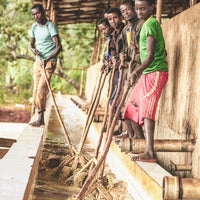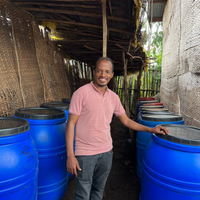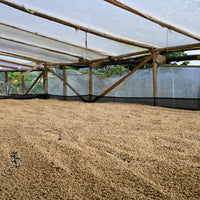Origin : Ethiopia
Region: Sidamo
Sub Region: Sidama Bensa
Altitude: 1894 meters above sea level
Owner: Dawit Dangiso
Variety: JARC vartieties, local landraces
Process: Natural
Tasting Notes: Sweet and complex with notes of blueberry, tropical fruit, black tea and melon.
Dawit Dagiso cultivates coffee at Shantawene Farm in Sidama Bensa, Sidamo. He grows a range of local landraces and JARC varieties, which have all evolved to thrive in Ethiopia’s climatic conditions.
Dawit inherited his farm in the 1990s and has raised his own family on the farm. Today, his two adult children help with the farm tasks, especially during the height of the season.
Working with Sucafina Ethiopia, Dawit gets technical support and training that help him make Shatawene Farm more sustainable and the coffee he produces more high-quality.
Dawit uses sustainable agroforestry practices to cultivate coffee. His farm is organic-by-default. In addition to coffee, he also grows false banana (enset), fruit trees and legumes. Fruit and timber trees provide shade for growing coffee and legumes fix nitrogen, a vital nutrient for growing all plants.
Dawit selectively handpicks ripe, red cherry and processes it on his farm. He lays cherry on raised beds to sun dry and rakes cherry frequently to ensure even drying. It takes approximately 2 to 3 weeks for cherry to dry. Once dry, Dawit bags cherry and stores it in a warehouse on the farm for about 5 months before it’s transported to the dry mill for processing.
Grades in Ethiopia depend on visual inspection for defects and on cup quality. Grade 1 is considered the highest quality coffee. Grade 1 and 2 are considered specialty coffee, grade 3-9 are classified as commercial coffee. Grade 1 is free of cup faults and taints and has zero quakers.
While Ethiopia is famous as coffee’s birthplace, today it remains a specialty coffee industry darling for its incredible variety of flavours. While full traceability has been difficult in recent history, new regulations have made direct purchasing possible. We’re partnering directly with farmers to help them produce top quality specialty lots that are now completely traceable, adding value for farmers and roasters, alike.
The exceptional quality of Ethiopian coffee is due to a combination of factors. The genetic diversity of coffee varieties means that we find a diversity of flavour, even between (or within) farms with similar growing conditions and processing. In addition to varieties, processing methods also contribute to end quality. The final key ingredients for excellent coffee in Ethiopia are the producing traditions that have created the genetic diversity, processing infrastructure and great coffee we enjoy today.
Most producers in Ethiopia are smallholders, and the majority continue to cultivate coffee using traditional methods. As a result, most coffee is grown with no chemical fertilizer or pesticide use. Coffee is almost entirely cultivated, harvested and dried using manual systems..







